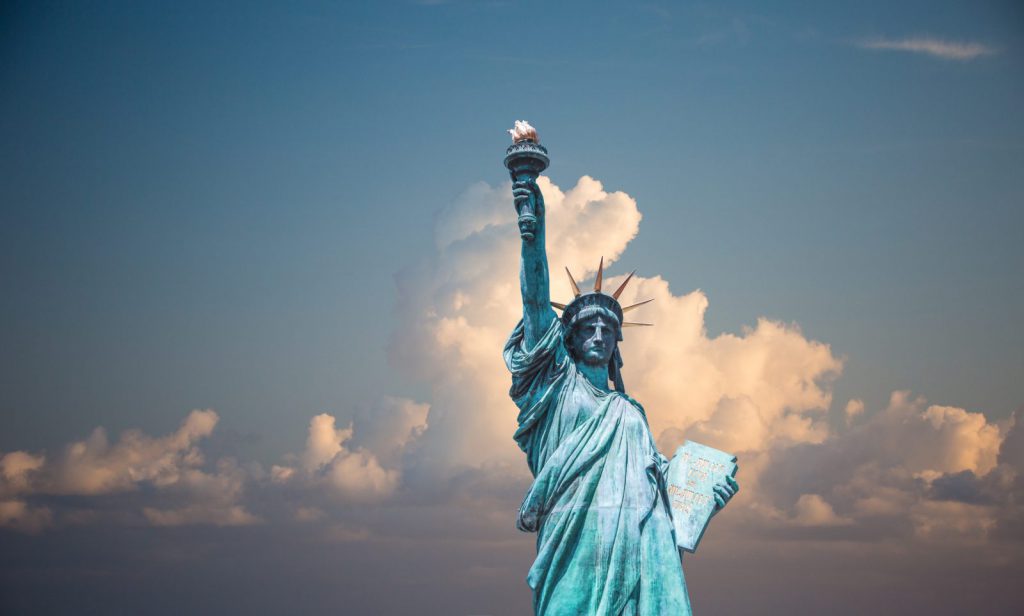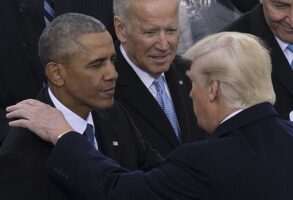
Published November 20, 2018
I have moved 34 times in my life; I have called many places “home.” My parents and I immigrated to the United States in 1978, and this gives me a somewhat different perspective than most Americans on the challenges and opportunities that immigration provides the nation. First and fundamentally, as Americans, we are conflicted between our desire to be generous, to share our land and give refuge to the many people in the world who come here or attempt to come here; and our concern that these very people seem to be unable or unwilling to become like us—Americans. Our country is changing in ways that make it seem no longer our country. And that makes us anxious.
This conflict within our society is alloyed with vagueness of what it means to be American, and a multicultural mentality that says it’s meaningless and hopeless to talk about the meaning of being an American (which even if it existed was just another manifestation of the white patriarchy). This contention in public life leaves the American people vulnerable to manipulative politicians who use these conflicted thoughts and emotions for their own personal power and ideological agenda.
Fixing Immigration Problems Through Policy Change?
In his book Melting Pot or Civil War? A Son of Immigrants Makes the Case Against Open Borders, Reihan Salam sees the anxiety and the cultural agitation over immigration issues and approaches the problem like it’s a broken machine that needs to be fixed—with the same utilitarian efficiency Americans are well known for—which in this case usually means addressing the problems through pragmatic socio-economic policy changes, and not through ethical or cultural persuasion. Melting Pot or Civil War? offers what we might call economic solutions to what is fundamentally a human and cultural problem.
As an immigrant bearing the wounds of rootlessness, I see the quiddities of the complex immigration universe primarily as an existential challenge. And only after understanding it on that plane, do I think we can be well-equipped to create a just and morally sound policy.
Now, I do not claim that Salam doesn’t see or understand the human dimensions of immigration, but that is not what takes priority in his book, and that’s really too bad. Born in America, Salam is a son of Bangladeshi immigrants, but his story and his family’s immigration experience play only a minor role in the book. For me as an immigrant, and as someone who studies the life and thought of immigrants, that lack of story was a big letdown. Melting Pot is policy-driven to a fault. On this germane topic of our time, we need human understanding—the religious, philosophical, and ethical—in which to ground policy.
In Melting Pot or Civil War? Salam is concerned about ethnic balkanization and is keen on finding paths to get back to a “middle-class melting pot” type of America. This is the key for Salam—the thing which he believes will keep America out of a civil war—and he spends the rest of the book laying out our current troubles and then prescribing one policy change after another that he believes will eventually pull most of the poor up into the middle class and thus everyone will melt right in.
Some of the policy changes Salam suggests include outsourcing or automating low-skill jobs, limiting low-skill immigrants because he believes they tend to stay in generational poverty cycles. By limiting the influx of low-skill immigrants he says we can then turn our attention and our money to instead invest in the younger generation of poor immigrants already here, giving them a chance to rise into the middle class. He encourages the increase of high-skill immigration and supports sojourners (those that come for a time to work and then go back to their country of origin). He proposes virtual immigration—living in one country but working in another.
One of the most important policy changes, in Salam’s view, is limiting family unification to nuclear family members only. This stops replenishing the ever-expanding ethnic communities. Cutting the ethnic flow will push those immigrants already here to intermarry with native born Americans. This phenomenon creates something akin to what happened with the Irish American and the Italian American immigrant groups of yesteryear. Their identity, Salam says, became “largely symbolic and optional.”
I think one of the most important cultural crises of our time is that we have “largely symbolic and optional” cultural identities. More of that would be absolutely pernicious, yet Salam thinks it’s a good thing. He believes it is good because intermarriage has a higher probability of the immigrant leaving behind his ethnic identity and assimilating more fully into the American culture. Assimilation offers the basis for the melting in, and if they are melted in, then they become one of us, and if they become one of us, we will not have ethnic strife. This thinking assumes that ethnic heritage, communities, and civic associations are interchangeable. Give us your ethnic identity and close-knit community and we’ll give you middle class status in the richest nation on earth. The emptiness of that promise is driving our society to melancholy and madness.
Other policy ideas include: amnesty for long-time well integrated undocumented persons, and building up less-developed countries in order to stem migration, and he proposes, as an alternative, charter cities: “new cities that are established with rules and institutions carefully designed to foster economic growth and upward mobility for the world’s poor.”
Cultural Fusion May Not Help
The goal for Salam is cultural fusion, and we arrive at it through a true assimilation, which he defines as a state “in which newcomers and established Americans come to resemble each other.” The mechanics of assimilation happens through language, the teaching of our history, stemming the flow of immigrants so as to necessitate intermarriage between immigrants and native-born Americans, and college education so as immigrants are pulled into the middle class they can economically, socially, and culturally melt in.
Salam is rightly concerned with the poor and uneducated, desiring to alleviate their hard situation. His answer is education: that will pull them up into the middle-class. For Salam, middle class status is a key of assimilation: It gives the immigrant a physical exit from poor ethnic communities, it opens social doors to intermarriage and a more pluralistic cosmopolitan society, and facilitates cultural fusion by speech, dress, entertainment choices and other cultural markers. I believe this approach is unrealistic and mechanistic. This is a common view in America, and I think we need to have a frank public conversation about it at another opportunity.
It is good to be concerned for the poor and uneducated. But the poor and uneducated we will always have with us, even if only in relative terms. And as concerned as I am about my fellow man, I cringe from ideas which attempt to “cure” human suffering. And that is a fundamental difference between my approach and others who think like Salam. Suffering is part of the human condition and we are called not to cure or abolish it, but to steward it, to gain wisdom from it, to channel it so that we and the world around us become more beautiful through it.
Low-skill work, can look like suffering from some people’s perspective. There is nothing fundamentally wrong with low-skill or low-education work; it does not automatically imply second-class citizenship. Nor is there anything fundamentally wrong with having a low income, as long as the human person is rightly respected and his dignity valued. There are many contented people who are not of the middle class. It is a fundamentally American error to believe that money solves all problems and eliminates human suffering. This is just not true.
Assimilation Won’t Save Us From Ourselves
I want to understand this book in the most charitable way, but from my reading (not fully knowing the heart of the author) it seems that Salam believes that attaining to middle class status provides permanent or semi-permanent social and material security. This is just not the case; I say this not only because of my own middle class standing and environment, but because before any of us took to understanding our current moment, Alexis de Tocqueville was there first.
There is no rest for the democratic men, and the middle-class has no assurance that they can retain their material wealth or status, but rather we middle-class democratic men are constantly plagued with anxiety and preoccupied with money. Tocqueville writes of the “feverish ardor” with which we “pursue well-being,” and that we are “constantly tormented by a vague fear of not having chosen the shortest route” to that well-being.
The inhabitant of the United States attaches himself to the goods of this world as if he were assured of not dying, and he rushes so precipitately to grasp those that pass within his reach that one would say he fears at each instant he will cease to live before he has enjoyed them. He grasps them all but without clutching them, and he soon allows them to escape from his hands so as to run after new enjoyments.
In the United States, a man carefully builds a dwelling in which to pass his declining years, and he sells it while the roof is being laid; he plants a garden and he rents it out just as he was going to taste its fruits; he clears a field and he leaves to others the care of harvesting its crops. He embraces a profession and quits it. He settles in a place from which he departs soon after so as to take his changing desires elsewhere….
If a social state in which law or custom no longer keeps anyone in his place is joined to the taste for material well-being, this too greatly excites further restiveness of spirit.
So Tocqueville wrote, a prescient man to whom we Americans are all just a footnote. Does anyone doubt that we are in the throes of the malady Tocqueville described? The cure isn’t to feed our materialist culture by increasing the bourgeois class. The ideology of equality is blinding us; our real malady is primarily spiritual, not necessarily economic. In other words, it will not go away but grow worse, even if everyone had the same financial standing. Tocqueville observed two important features of equality that are relevant to our immediate discussion: that perfect equality can only be had by force, and the insatiable nature of equality—the more we have it, the more our appetite for it increases. This leads us to seek it with an “ardent, insatiable, eternal, invincible passion.” So much so, that men would allow themselves to be enslaved in order to gain it. And yet, Tocqueville wrote, the equality we desire always proves illusory.
Jobs are good; a roof overhead is a blessing; food to feed the children is a gift from God. But how my soul is distressed at the opportunity lost in this book. A call for jobs and material wealth and policies that would optimize those things when souls are tossed to and fro in this world from a deeper suffering. Life is so much more than pulling people up into the middle class! Salam has a wonderful mind for policy, and he has some smart ideas in this book. But my view of the human person is not that he is primarily a producing and consuming human animal concerned primarily with his economic well-being, but that he is a created being whose destiny is the ultimate good.
He may not see it, but some of his policy suggestions stand against his claim of concern for the poor. If Salam was concerned primarily with pulling people out of poverty then he would see that even a low-skilled worker can be content with doing simple jobs so as to feed their family.
It’s vexing to see this complicated issue reduced to money, standards of living, and material goods. Alexis de Tocqueville wrote:
As men become more alike and the principle of equality penetrates more peacefully and more deeply into institutions and mores, the rules of advancement become more inflexible and advancement slower…. By hatred of privilege and embarrassment over choosing, one comes to compel all men, whatever their stature might be, to pass through the same filter.
Salam leaves the reader with the sense that if we but “make them pass through a filter,” all will dwell in harmony. That is the idea that if as many people as possible could get a college education then they will make more money, live in better neighborhoods, and resemble each other to such a degree that we will greatly reduce conflict. I cannot subscribe to that conception of man and his human condition.
Luma Simms, a fellow at the Ethics and Public Policy Center, has written on the life and thought of immigrants for First Things, the Federalist, and many other publications.




